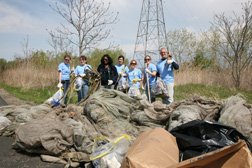Apr 22 2010
More than 50 students, faculty and staff from the College of Nanoscale Science and Engineering ("CNSE") of the University at Albany marked the 40th anniversary of Earth Day today by cleaning up litter and debris along the Hudson River to highlight environmental awareness and stewardship.

Spearheaded by CNSE's Center for Sustainable Ecosystem Nanotechnologies ("CSEN"), the first-ever effort centered at the Corning Preserve in Albany was conducted in conjunction with the National River CleanupTM and Canal Cleansweep 2010.
CNSE's participation supported efforts by tens of thousands of volunteers taking part in hundreds of cleanups across the country in removing trash from local rivers and streams. National River CleanupTM, sponsored by American Rivers, includes a series of community-based cleanups occurring nationwide. Canal Cleansweep 2010 is a public awareness event that focuses on the magnitude of trash accumulation in the New York State Canal System.
"Nanotechnology innovations, including the socially responsible pioneering work being done by the UAlbany NanoCollege and its Center for Sustainable Ecosystem Nanotechnologies, are playing an integral role in developing renewable sources of energy and promoting a cleaner environment," said Dr. Alain E. Kaloyeros, Senior Vice President and Chief Executive Officer of CNSE. "This volunteer effort further demonstrates CNSE's strong commitment to supporting and preserving a healthy ecosystem in our own community for future generations."
"CNSE's Center for Sustainable Ecosystem Nanotechnologies is dedicated to advancing nanoscale solutions to address our global sustainability challenges," said Dr. John F. Elter, CNSE Empire Innovation Professor of Nanoengineering and Executive Director of CSEN. "We spend our days on nanotechnology research to enable sustainable energy and clean water technologies, but we also recognize the importance of traditional approaches to supporting a healthier environment, which includes getting out and picking up trash along the river."